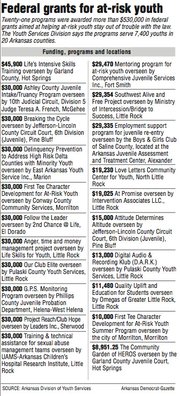Twenty-one programs aimed at helping at-risk youths learn job skills, stay in school and control their behavior were awarded federal grants totaling $530,715, the Arkansas Division of Youth Services announced Tuesday.
The programs plan to serve more than 7,400 youths in 20 counties with the goal of keeping them in their communities and out of trouble with the law.
"We believe that each of these programs is an important part of helping Arkansas implement successful, long-term strategies to address the problems associated with juvenile delinquency," Youth Services Division Director Tracy Steele said in a written statement.
The grant money came from the federal Office of Juvenile Justice and Delinquency Prevention. The state Youth Services Division along with the Arkansas Coalition for Juvenile Justice selected the 21 programs out of 30 applicants.
The federal money is supposed to help establish programs for a few years in the hope that communities will see benefits and take on funding them in the future.
All of the awarded grants went to "community-based programs" that aim to improve the juvenile justice system or curb juvenile delinquency.
The programs include after-school mentoring, summer recreational activities and substance abuse counseling that benefit children who are at risk of becoming delinquent or are already under court supervision.
Garland County received the most federal money -- $49,500 from two different grants -- for its Life's Intensive Skills Training, or L.I.S.T., program, according to data released by the Youth Services Division.
Lt. Belinda Cosgrove of the Garland County Juvenile Detention Center, which oversees the program, said she expects the program will serve about 50 youths and provide instruction for four hours a day, five days a week on social skills, nutrition, wellness, healthy cooking, fitness, literacy, and music and art appreciation.
"A lot of these kids haven't been able to engage in normal activity, so we want to provide them with that normal music and art. ... They can learn how to cook. They can learn how to budget. Just skills that they need to go on and be successful in school and in life," she said.
Cosgrove said the program serves youths ages 10 to 18 by court order, including children on probation. The program began Tuesday and will run until Sept. 1.
"They're kids that made a bad decision. It doesn't mean that they're bad kids. ... We can't say that we can change every kid, but we want to provide opportunities," Cosgrove said.
In Union County, nonprofit 2nd Chance @ Life was awarded $30,000 for its Follow the Leader program, a peer-based mentoring program that it started last year in El Dorado.
"We use older kids that have already been in some trouble but are trying to get out of trouble to mentor the younger kids and say, 'Hey, you can't go down this road,'" said Domanique Robinson, the nonprofit's business manager.
Robinson said the after-school mentoring program will be in place by August in at least one of the school districts in the 10 counties served by the nonprofit. The program will run Monday through Friday during the school year and serve first through 12th grades.
Robinson said the nonprofit is still reviewing the school districts it serves to determine where the most need for the program exists.
In the Delta, nonprofit East Arkansas Youth Services also received $30,000 that will fund a portion of the salaries for its substance abuse counseling and a mentoring program.
Madelyn Keith, the nonprofit's executive director, said the grant goes toward paying salaries of two employees who are training to be substance abuse counselors.
It also will pay a portion of the salary of John G. Smith, who runs the Boys 2 Men mentoring program in Wynne, a partner organization of Keith's nonprofit.
"They play basketball there. They lift weights. He uses it all in the capacity of strong character and a strong sense of responsibility makes you a strong person," Keith said.
The programs funded by the grant target first-time, nonviolent offenders, because "you have the best chance to be effective with those that haven't progressed as deep into the system," Keith said.
This was the second year Keith's nonprofit received the federal grant. Last year, it received $50,000 for the same two programs.
The programs target youths from minority groups that have "disproportionate contact" with the juvenile justice system.
In the past 14 months, the money went toward substance abuse counseling for 95 children, 76 of whom were from minority groups. The mentoring program served 15 children, 12 of whom were from minority groups.
Amy Webb, spokesman for the Arkansas Department of Human Services, which oversees the Youth Services Division, said each program is required to submit invoices to the division, which then reimburses the expenses with grant money.
The grants run for one year, but each program is eligible to reapply for additional funding over the next two years. The grant amounts would "step-down" by 20 percent each of the additional years if awarded, Webb said.
Metro on 07/02/2014
